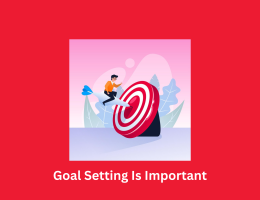
Navigating Career Aspirations: Strategies for Effective Career Goal Setting
- By admin --
- Sunday, 17 Mar, 2024
Introduction:
In the dynamic landscape of professional endeavors, goal setting serves as a compass, guiding individuals towards their desired career destinations. Whether aiming to advance within their current roles, transition to new careers, or embark on entrepreneurial ventures, setting clear and strategic career objectives is essential for success. This essay explores the intricacies of career goal setting, offering insights and strategies tailored to various career aspirations, from climbing the corporate ladder to forging new paths as an entrepreneur.
Understanding Career Goal Setting:
1.Advancing in a Current Job:
- For individuals seeking advancement within their current roles, setting career goals involves identifying opportunities for growth, skill enhancement, and increased responsibility within their organization.
- Examples of career goals in this context may include securing a promotion to a higher position, acquiring specialized certifications or qualifications, or spearheading key projects or initiatives.
2.Changing Careers:
- Changing careers requires a strategic approach to goal setting that involves assessing transferable skills, exploring new industries or roles, and identifying opportunities for professional reinvention.
- Career goals for individuals transitioning to new careers may include gaining relevant experience through internships or volunteer work, acquiring additional education or training, or networking with professionals in their desired field.
3.Starting a Business:
- Entrepreneurs embarking on the journey of starting a business must set ambitious yet achievable goals that align with their vision, mission, and values.
- Career goals for aspiring entrepreneurs may encompass launching a successful startup, securing funding or investment, building a strong customer base, and achieving profitability and sustainability.
Strategies for Effective Career Goal Setting:
1.Self-Assessment and Reflection:
- Begin by conducting a thorough self-assessment to identify your strengths, weaknesses, interests, and values. Reflect on your career aspirations, passions, and long-term goals to inform your goal-setting process effectively.
2.Establish Clear and Specific Goals:
- Set clear, specific, and actionable career goals that are aligned with your overarching objectives and aspirations. Ensure that each goal is measurable, attainable, relevant, and time-bound (SMART criteria) to enhance clarity and accountability.
3.Prioritize and Sequence Goals:
- Prioritize your career goals based on their importance, feasibility, and potential impact on your professional growth and development. Sequence your goals in a logical order that allows for gradual progression and momentum building.
4.Break Down Goals into Manageable Steps:
- Break down larger career goals into smaller, manageable tasks or milestones that can be tackled incrementally. This approach facilitates progress tracking, reduces overwhelm, and enhances motivation and momentum.
5.Leverage Networking and Mentorship:
- Build a strong network of professional contacts and seek mentorship from experienced individuals in your field or industry. Networking and mentorship can provide valuable insights, guidance, and opportunities to support your career goals.
6.Invest in Continuous Learning and Development:
- Commit to lifelong learning and professional development to enhance your skills, knowledge, and expertise. Pursue relevant certifications, attend workshops or seminars, and seek out opportunities for skill acquisition and growth.
7.Embrace Adaptability and Resilience:
- Remain adaptable and resilient in the face of challenges, setbacks, and uncertainties. Be prepared to pivot, adjust, and recalibrate your career goals as needed in response to changing circumstances or opportunities.
8.Celebrate Achievements and Milestones:
- "Do not ignore your small wins and successes along the way. Recognize and commend yourself upon reaching milestones and moving closer to your career goals. It will help you stay motivated and feel like you have made some progress."
Conclusion:
Effective career goals are one of the fundamental aspects of successful profession advancement and satisfaction; they enable someone to pursue his/her career paths clearly marked with purposeful direction. No matter what people want being promoted in these roles they are in now or start pursuing new business initiatives, they have to be able to set well thought-out targets that will conform with what they wish to achieve.





